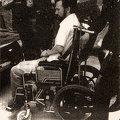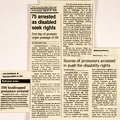PHOTO by Tom Olin: Close up of Mike Auberger with mouth open chanting. Around his neck is a kryptonite lock locked to a second lock, which is locked to a revolving door. He wears and ADAPT bandanna around his head and long braids. Caption reads: ADAPT member Mike Auberger puts his neck on the line.
DISABILITY RIGHTS ADVOCATES
TURN UP THE HEAT IN CAPITOL
In more ways than one, the heat was turned up in Washington, D.C. during the week of March 11 to March 17, 1990. Weather records were shattered as the mercury climbed to 89 degrees on Monday and remained hot all week; the cherry blossoms at the Tidal Basin bloomed three weeks early.
There was another heat wave going on as people with disabilities from all over the country converged on the Capitol to push for the Americans with Disabilities Act, which passed the Senate last September and is now stalled in the House.
On Monday, March l2, we gathered in front of the White House at noon. Over 1000 strong, most in wheelchairs but including people who are deaf and blind, we marched down Pennsylvania Avenue, the 17 blocks to the U.S. Capitol. We carried signs and chanted “ADA Now!"
At the Capitol, Justin Dart, chairman of the President's Committee, said that partial equality is not equality: “We want an end to discrimination
against the disabled, the nation's most impoverished, isolated and segregated minority." King Jordan, president of Gallaudet University, warned “If we don’t get what we want, we will be back to stay." Mike Auberger, from ADAPT, closed with a stirring speech. “We are Americans," he said, “and we want the same rights as everyone else."
After the speeches, many abandoned their wheelchairs and climbed the 83 steps on the west front of the Capitol, as a symbolic gesture dramatizing the barriers that the disabled still face.
On Tuesday, many assembled in the huge rotunda inside the U.S. Capitol and heard speeches by Speaker Thomas Foley, Congressman Robert Michel and Congressman Stenny Hoyer of Maryland, who is coordinating the House legislative effort on ADA. Hearing that no promises could be given as to the date of a House vote, many started chanting “ADA Now!" Many were arrested for illegal entry, carried in police vans to a police facility and then to court for paper work. Many did not get back to the hotel until midnight. It was a matter of individual conscience whether anyone was arrested; many chose not to, believing that the legislative process has been working well so far.
On Wednesday. about 60 were arrested at the Rayburn Building in and near the office of Congressman Bud Shuster of Pennsylvania, who had supported
some weakening amendments to ADA.
On Thursday, a small group (their numbers reduced because so many were in court) assembled at housing and urban development and asked to see
secretary Jack Kemp; he was out of town but Undersecretary Alfred Dellabovi came down. There was a productive talk concerning the Fair Housing Amendment Act of 1988. Some weakening amendments to the Housing Act, relating to access standards, had been proposed; the disability groups strongly opposed.
On Friday, some members of ADAPT protested at the Greyhound terminal. Some of the strongest opposition to ADA has come from Greyhound and other private bus companies, who fear that the cost of wheelchair lifts will be excessive. But the disability groups claim as much a right to be on a bus as anyone else.
After a glorious week, the participants began the long journey home by train, bus, airplane or dust-covered van. Though many other disability
groups were involved, much credit goes to Wade Blank, Mike Auberger, Bob Kafka, and Mark Johnson, all of ADAPT. It‘s too early to tell whether our goals have been reached, but there was a feeling of solidarity. and of a successful crusade on behalf of equal rights for disabled people in
employment, in transportation, in housing, in places of public accommodation, in every aspect of American life. That, indeed, is the purpose of the Americans with Disabilities Act.
—Richard B. Treanor
At the bottom of the page is a Callahan cartoon: Three women in a row. First woman is in a wheelchair and below her it says "M.S." Second woman is standing with a walker and below her it says "M.D." Third woman is very overweight and below her it says "M&Ms".
- Created on
- Friday 12 July 2013
- Posted on
- Monday 29 June 2015
- Tags
- ADA, arrest, blind, deaf, Fair Housing Amendments Act 1988, Greyhound, HUD, I King Jordan, Justin Dart Jr., kryptonite lock, Mike Auberger, people with disabilities, Rotunda, Secretary Jack Kemp, US Capitol, wheelchairs, White House
- Albums
- Visits
- 4395
- Rating score
- no rate
- Rate this photo


0 comments